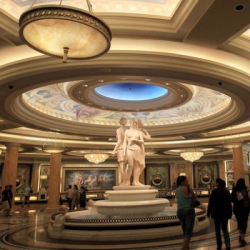
Paul Phua and Associated Ran a Sports Betting Ring out of 3 Suites at Caesars Palace in July 2014
According to defense lawyers in the Paul Phua illegal sports betting trial, federal agents collected evidence illegally and that evidence should be dismissed. On Tuesday, defense lawyers for four of the eight men on trial filed a motion to dismiss the evidence in the trial. If the judge in the case did as suggested, the government’s case likely would fall apart.
FBI agents impersonated repair technicians to surreptitiously secure evidence in a Las Vegas online sports betting case. Operators of an illegal online sportsbook website had rented three luxury villas at the Caesars Palace on the Las Vegas Strip. Staff at the hotel has reported to management suspicious activity, so the management called local authorities.
Turned off Internet Access
Agents are thought to have worked with Nevada authorities and a hotel computer contractor to turn off the men’s computer access, making them believe they had an equipment problem. Agents placed a laptop in their room, hoping to tape wrongdoign. The information collected from these actions allowed the FBI to get a search warrant. Now, the defense team wants to have the evidence obtained in a roundabout fashion from the ruse to be dismissed.
Eventually, agents of the Nevada Gaming Commission and the FBI combined to raid the villas and arrest 8 men, including Paul Phua, his son Darren Wai Kit Phua, Seng Chen Yong, and Wai Kin Yong. Against the advice of Kimberly Frayn, an assistant U.S. attorney, agents obtained evidence by pretending to be computer repairmen. Such evidence is being challenged in court, and could prove to be a key moment in the trial.
“It Was a Consent Issue”
Recordings of a conversation between agents of the Federal Bureau of Investigation and Kimberly Frayn had the prosecutor tell agents “it was a consent issue“. Under U.S. law, a person whose property is inspected must waive their “constitutional protections against unreasonable searches”, unless investigators get a search warrant.
Evidence which is collected improperly is supposed to be inadmissible in court. Therefore, the current filing goes to the heart of the case. In the present case, investigators who were pretending to be Geek Squad repairmen obviously received no permission to search for evidence. When contacted about the filing, Las Vegas offices of the FBI referred those questions to the U.S. Attorneys Office in Las Vegas. Natalie Collins, who serves as spokeswoman for the U.S. Attorney Daniel Bogden, said that the prosecution is aware of the allegations made by Phua’s defense team, but she declined to comment on those allegations.
Not Likely to Stand Up in Court
Defense lawyer Thomas Goldberg said they only became aware of the ploy when they overheard investigators on recordings call for the Internet access to be turned off. Thomas Goldstein told the Associated Press, “They were trying everything they could to get inside without a warrant.”
Mark Rasch, a respected ex-federal prosecutor, said the evidence probably will not hold up in court. Rasch told the AP, “Police are allowed to use a certain kind of subterfuge, but what they can’t do is create a certain kind of circumstance.”
Three Cases in Several Weeks
This is the third time in the last several weeks that federal authorities have been accused of using improper techniques to obtain evidence. The FBI posted a fake story attributed to the Associated Press in the hopes of tricking a bomb-threat suspect into posting on a particular website. The Associated Press objected to the practice, saying the FBI’s fake news story “undermined the AP’s credibility” and was “unacceptable”.
The Drug Enforcement Administration used information and photographs taken from a woman arrested for cocaine possession to set up a Facebook account. The DEA used this fake Facebook account to try to lure the woman’s friends and family into revealing incriminating evidence to authorities.
About Paul Phua
Phua is a well known professional poker player, who has won international tournaments and played high stakes ring games with the world’s most famous players. Phua was the ambassador for the tiny nation of San Marino for 3 years. He also made $400 million through his online sportsbook. Besides all of that, he is also suspected of being affiliated with the 14k Triad, a notorious Chinese crime syndicate.
After Phua was arrested, he was released to house arrest for a short time, after putting up his $40 million private jet as collateral. ICE detained him and his son, while professional poker players like Phil Ivey put up $1.5 million apiece to see Paul Phua released from jail.
